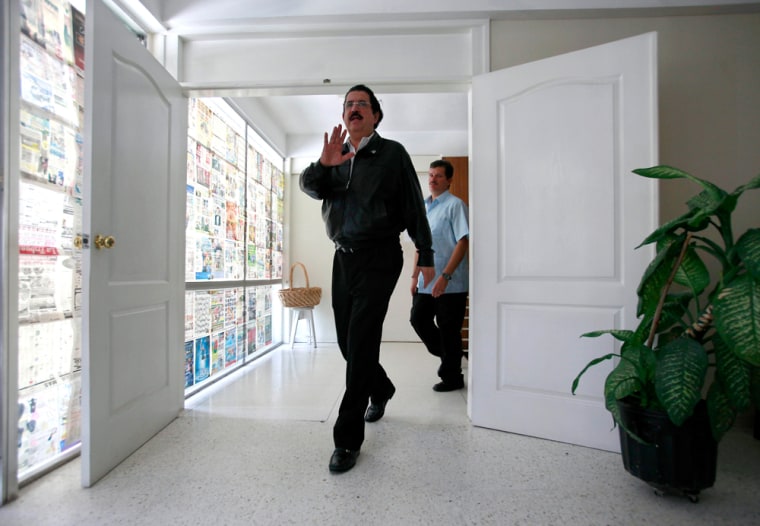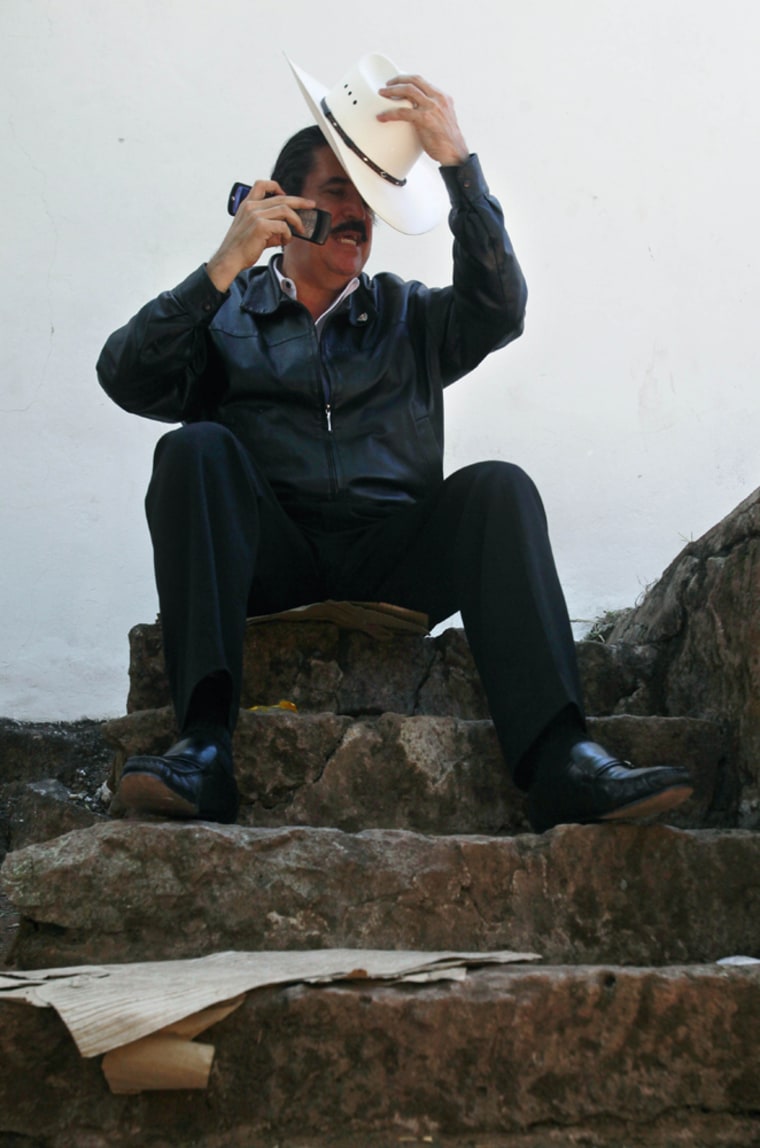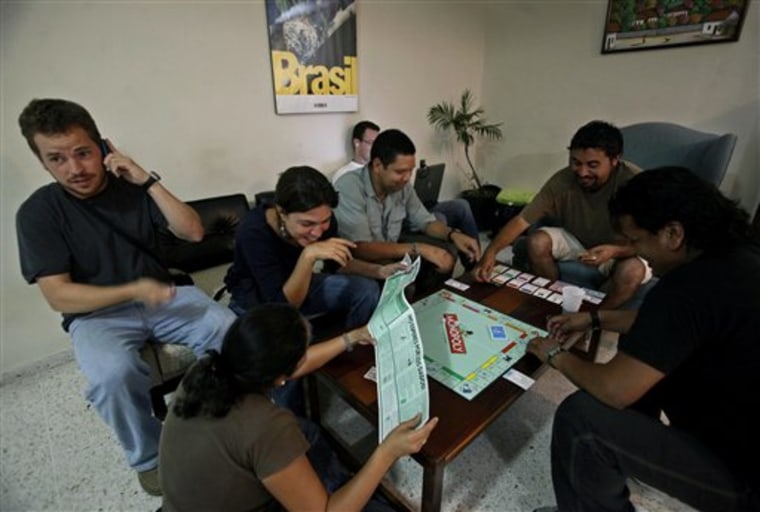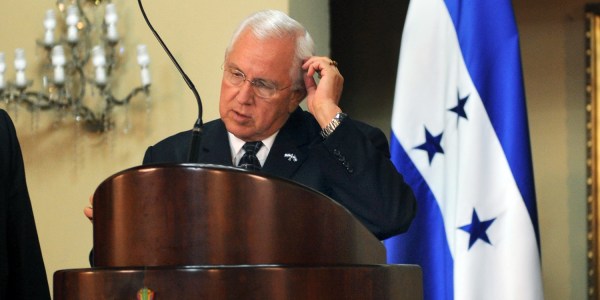Nearly a month has passed since I slept in the dark.
All night long, floodlights shine on the Brazilian Embassy where I have been holed up with ousted Honduran President Manuel Zelaya since he slipped back into the country.
When I do manage to sleep, I'm awakened by high-pitched cat calls from the soldiers ringing the compound, and music so loud the windows vibrate.
Day or night, through every window, police officers and soldiers stare in at me and the other journalists through binoculars.
When I'm not trying to do my job taking pictures of Zelaya and his entourage, I pass the time reading; I now know more about Brazil than I ever hoped to — the embassy has an impressive collection of books about the South American country.
Honduras' coup-installed government says soldiers will arrest Zelaya if he leaves the diplomatic mission. Zelaya says he is not going anywhere until he is reinstated as president, and the Brazilian government, which also wants him returned to power, has not pressured him or his supporters to leave.
So we in the media who pushed our way in when Zelaya took up residence here on Sept. 21 are stuck. Once we leave, we can't get back in.
Still, time has taken its toll as the crisis drags on, and Zelaya's group of fist-waving supporters dwindles with each passing week. Even Zelaya's son went home recently, hugging his mother, who stayed behind.
Sleep 'the biggest challenge'
Talks stalled again after interim President Roberto Micheletti refused to budge on allowing Zelaya to be reinstated — the central point of a power-sharing agreement the two sides are negotiating.
A delegation headed by U.S. Assistant Secretary of State Tom Shannon is headed to Honduras this week to urge the two sides to find a solution, State Department spokesman Ian Kelly said Tuesday.
Zelaya says if there is no breakthrough this week it will never happen, but he has not said what he would do then. In the meantime, Micheletti's government is banking on the Nov. 29 elections to end the crisis: Zelaya is not eligible to run since the Honduran constitution allows presidents to serve only one four-year term.
Meanwhile, those of us inside try to make the best of the situation; the other journalists and I while away the hours playing endless games of Monopoly and cards.

Sleep is the biggest challenge.
The Zelaya supporters have put up a curtain to block the floodlights and covered windows with newspapers, but that has made little difference.
Soldiers bark like dogs, meow like cats and crow like roosters just as my REM cycle gets going and I'm jolted awake almost nightly.
Troops last week blasted us with music from 1:30 a.m. until 7 a.m. The playlist included the grating Spanish ballad "Two-legged Rat," an accordion-laced tirade against an ex-boyfriend made famous by Mexican singer Paquita La del Barrio. Its lyrics begin, "Filthy rat, crawling animal, scum of all life ..." and it got worse from there.
That was a rough night.
Messing with our heads
The lack of sleep no doubt fogs your mind. So do the idle hours.
Zelaya's supporters take turns standing watch in three-hour shifts so they can sound the alarm if troops make any sudden movements indicating they have decided to storm the embassy — despite the interim government's promises not to do so.
Troops and police have erected platforms so they are at eye-level with the windows. The other journalists and I stare at them. They stare at us. Right now a police officer is staring at me through his binoculars. "Hi," I think.
The interim government also recently put a large apparatus covered in plastic at the compound's back wall. No one knows what it is, but people's sleep-deprived minds spin with the possibilities.
Zelaya's supporters say it transmits "electromagnetic radiation" to mess with their heads. The leftist leader says he believes Micheletti's government has pumped in toxic gas. Some complain of headaches.
The Organization of American States says the troops are harassing the embassy's occupants and affecting them physically with the loud music and night-long cat calls; Brazil has demanded an immediate halt to the tactics.
The military denies any harassment. Micheletti's government accuses Brazil of violating its diplomatic status by sheltering Zelaya. It contends soldiers acted legally in ousting him June 28 after he defied a Supreme Court order to cancel a referendum they say was aimed at rewriting the constitution to lift the ban on presidential term limits. Zelaya denies that was his plan.
Still, life inside the embassy in some ways has become easier since those early days when the interim government cut water, power, telephone service and food was scarce.
Shorter wait for a shower
Back then, some 300 Zelaya supporters and 12 journalists were crammed together with only three bathrooms. There was a bout of diarrhea. Need I say more?
Now only about 35 Zelaya supporters and five journalists remain. The wait for a shower has gone from two hours to 20 minutes; the toilets are cleaner.
We all now have blankets to ease the chill of sleeping on the cement floor. Some even have inflatable mattresses, although soldiers still randomly stop the majority of such amenities from coming in.
A nearby restaurant provides the journalists with breakfast, lunch and dinner. Or rather rice and beans, rice and beans, rice and beans, with the only variety a bit of meat or fish or eggs.
I am starting to forget what it was like to eat for pleasure.
Zelaya's daughter sends him, his wife and close advisers their meals.
Zelaya and his wife have taken up residence in two offices in the two-story embassy, where he sleeps on an inflatable mattress and spends his days receiving foreign officials or talking on his cell phone on the roof, one of the few spots that gets a signal.
The windows where he works are covered with aluminum foil in the belief that will help counteract the block on cell phone signals.

At first he seemed irked by the fact that he was locked up with the media, and he would tell us when he did not like a story or photo. But he has since realized there is no escaping us and now jokes with us.
He recently shot a photo of me while I was taking his picture.
"I'm going to take a picture of him next to that bush," he told the other photographers. "That's a good photo. I used to be a fan of photography. I took a lot of pictures — although not as many as you guys."
To pass the time, some of Zelaya's backers play music on plastic water jugs. Others garden or exercise on the roof with Zelaya's wife.
As for myself and the other journalists: We shoot photos and wait to see how history plays out.

